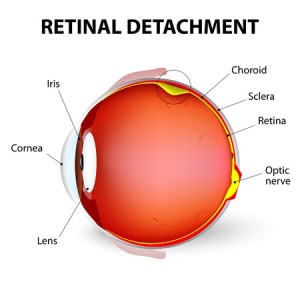Flashes & Floaters
What Are Floaters?
 Floaters are small specks of wispy threads drifting across your field of vision. They may appear as different shapes and colors. Blinking does not get rid of the specks or threads. The specks or threads also move with movements of the eye. Floaters are actually small clumps of fibers inside the vitreous, the clear gel like fluid filling the posterior portion of the eye. While annoying for patients, most times flashes and floaters are not dangerous and usually disappear within a few weeks to months.
Floaters are small specks of wispy threads drifting across your field of vision. They may appear as different shapes and colors. Blinking does not get rid of the specks or threads. The specks or threads also move with movements of the eye. Floaters are actually small clumps of fibers inside the vitreous, the clear gel like fluid filling the posterior portion of the eye. While annoying for patients, most times flashes and floaters are not dangerous and usually disappear within a few weeks to months.
What Are Flashes?
When the vitreous gel tugs on the retina, it stimulates photoreceptors (light receptors) and you may see flashes of light.
Why Do People Get Floaters?
 There are different types of floaters and different causes. Throughout our youth, the vitreous gel has a firm gel like consistency. As we get older, this gel begins to liquefy. Sometimes little pockets of gel are left behind and float around in this watery center of the vitreous giving the appearance of floating specks of dust or wispy threads. In general, eyes that are injured, inflamed, or nearsighted are more likely to get floaters. The incidence of flashes and floaters increase with age.
There are different types of floaters and different causes. Throughout our youth, the vitreous gel has a firm gel like consistency. As we get older, this gel begins to liquefy. Sometimes little pockets of gel are left behind and float around in this watery center of the vitreous giving the appearance of floating specks of dust or wispy threads. In general, eyes that are injured, inflamed, or nearsighted are more likely to get floaters. The incidence of flashes and floaters increase with age.
Very rarely, something that looks like a floater turns out to be small droplets of blood in the posterior portion of the eye. This could be caused by an injury or by several conditions of the eye such as Diabetes.
When Are Flashes And Floaters Dangerous?
It is not possible to determine the cause of flashes and floaters or to determine if there are any associated retinal tears, holes or retinal detachment without a dilated eye exam. It is therefore important for anyone with these symptoms (especially a shower of spots, floaters with flashes of lights) to schedule an appointment with their eye doctor as soon as possible.
Sometimes the vitreous body fibers can tug or pull on the retina resulting in retinal tears or holes. Liquefied vitreous can then invade the subretinal space and cause a retinal detachment. If a retinal detachment is not identified and reattached in a timely fashion then vision loss may be permanent.
Can Floaters Be Treated?
Only after a careful examination can your doctor give advice about possible treatment for floaters. In many cases, the examination will confirm that the floaters are not a symptom of a more dangerous condition. The doctor might just recommend that the patient have eye examinations more frequently to make sure that the eye with floaters does not get any of the more serious conditions later.





